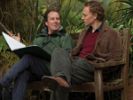Eye For Film >> Movies >> Archipelago (2010) Film Review
British director Joanna Hogg follows up 2007’s Unrelated with another slow-cooker simmering of the English bourgeoisie on holiday.
This time it’s just one family under scrutiny, Tom Hiddleston’s 20-odd Edward, his timid mother Patricia (Kate Fahy) and his more acerbic older sister Cynthia (Lydia Leonard). Ed’s on the cusp of a gap year volunteering in Africa so Patricia convenes them all on the idyllic Tresco in the Isles of Scilly to give him a good send-off. They’re joined by Christopher Baker’s local artist for painting lessons and Amy Lloyd’s Rose, a live-in cook and general ‘help’.

Plopped into near solitude amid some truly beautiful landscapes, they dabble with the oils, stretch some legs, go cycling and have the odd picnic, all the while waiting for pater to arrive. Soon enough the bracing sea air's blowing the dust from some all too apparent fissures within the family.
It’s a deliberately Spartan set up which Hogg handles with more assuredness than before. Her framing is less obviously stylised, more confident in its use of natural environments and exploiting the empty spaces she finds there. It’s an accomplished approach which, married with Edward Charlton’s soft palette cinematography, adds calm nuance to her central themes.
Once again Hogg shows the upper echelons of the chattering classes finding chatting amongst their kith an arduous task. The conversation flows congenially at one level, but all the while the family gently roil with suppressed emotions, anxieties and resentments. Inevitably, these vent, wealth and opportunity clearly no succour for good old family dysfunction.
There are touching, unaffected moments of humour, mostly in the first act, but her characters’ islands are all connected under the surface by a pervasive middle-class malaise. They just don’t seem that happy to be around each other for very long, it’s too awkward. Hogg nails this sentiment, a painful lacking that they can hardly bear to acknowledge, while avoiding overt melodrama or the mechanical histrionics of some clichéd terrible secret from the past.
The father-husband figure is a significant presence, conspicuous in his prolonged absence while still casting shadows over those anticipating his arrival. They are all entrenched in a kind of obedient acceptance, a bowing acquiescence to a paterfamilias who has clearly provided much in the way of material comfort, but at a cost to something more nurturing.
That Hogg can restlessly thumb this deeply uncomfortable vein is thanks in no small part to the clutch of uniformly solid performances. Hiddleston remains at the listless centre as it is Edward’s imminent departure that helps pop a few corks. He underplays what could so easily have been a spoiled oik role and goes some way to evince a grown man still very much a lost boy. As he turns to an artist he hardly knows for fatherly advice and soft-pedal pines for working class Rose, more for her apparent sense of purpose than anything else, it’s clear his idealised, patronising stint in Africa is unlikely to give him the fulfillment he’s after.
Hogg has been praised for her bravery in making films about the contemporary middle class and she has certainly succeeded again here, sedately unfolding a web of universal issues with a deceptive simplicity. However, the filmmakers’ claims that this is how most people in the UK live, affluent, Farrow & Ball’d up with the attendant accoutrements, helicopters, hired help and all, does rather stick in my craw. Nonetheless, Archipelago lingers intriguingly.
The film deserves to stand on its own merits, but being released at a time when ‘austerity measures’ are biting and The Middle Class apparently endures squeezes from all sides, could prove significant for its initial reception. It remains to be seen whether watching Ed’s lot fret ‘n’ fray on holiday will prove a cathartic release or an infuriating picture of indulgence.
Reviewed on: 09 Feb 2011



















